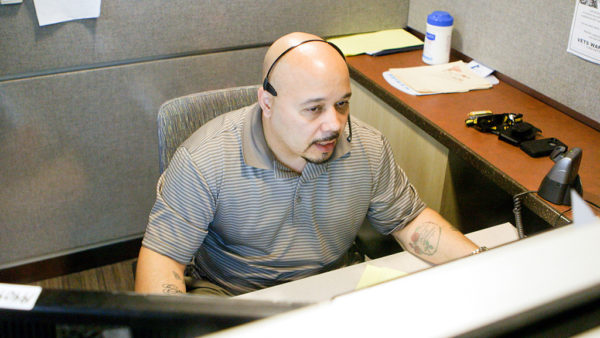Since 2001, more veterans have died by their own hand than in combat in Iraq and Afghanistan. According to the U.S. Department of Veterans Affairs, one veteran dies by suicide in America every 80 minutes. While only 1% of Americans has served in the military, former service members account for 20% of all suicides in the U.S. Based in Canandaigua, NY and open 24 hours a day, 365 days a year, the Veterans Crisis Line receives more than 22,000 calls each month from veterans of all conflicts who are struggling or contemplating suicide due to the psychological wounds of war and the challenges of returning to civilian life. The timely documentary CRISIS HOTLINE: VETERANS PRESS 1 spotlights the traumas endured by America’s veterans, as seen through the work of the hotline’s trained responders, who provide immediate intervention and support in hopes of saving the lives of service members. After serving their country overseas, many military veterans struggle with post-traumatic stress, depression and addiction. Since 2007, the Veterans Crisis Line has answered about 900,000 calls. CRISIS HOTLINE highlights how its dedicated responders react to a variety of complex calls and handle the emotional aftermath of what can be life-and-death conversations. The film captures these extremely private moments, where the professionals, many of whom are themselves veterans or veterans’ spouses, can often interrupt the thoughts and plans of suicidal callers to steer them out of crisis. Hotline workers sometimes intervene successfully by seizing on the caller’s ambivalence and illuminating his or her reasons for living. The responders work diligently with rescue coordinators to keep vets safe before help arrives. Many are like Kenneth, an Afghanistan war veteran and father of five who is tormented by recurring dreams of “bodies face-down in the water.” “You’re their father,” responder Darlene tells the former Marine. “No one can replace you.” “This is a good ending to this day,” says Bob, a Crisis Line supervisor, after a daylong search for an anonymous caller concludes with the distressed young man being admitted to an Army medical facility. At the call center, success means keeping the callers engaged in communication until they are out of immediate danger. Just as the veterans suffer from loneliness and feelings of isolation, Crisis Line workers strive to support each other, particularly in fraught, emotionally taxing moments. Robert, an emergency coordinator, remembers losing a caller to suicide and the ensuing feelings of anger, sadness and self-doubt. But after processing the loss with a supervisor, he notes, “We get back to work as fast as we can. We’ve got other vets to work with.” “Depression is really hard to work on, on your own,” Maureen tells a suicidal veteran on Christmas Eve. With American veterans taking their own lives at a rate of 22 a day, the work of the Veterans Crisis Line has never been more critical. All year, 24 hours a day, the responders fight an invisible enemy that endangers service members even after they’ve returned home from war. Ellen Goosenberg Kent’s HBO credits include “Wartorn: 1861-2013,” the Emmy® nominees “Alive Day Memories: Home from Iraq” and “Talked to Death,” and the Emmy® winners “How Do You Spell God?,” “Going, Going, Almost Gone! Animals in Danger,” “I Have Tourette’s But Tourette’s Doesn’t Have Me” and “Happy to Be Nappy and Other Stories of Me.” The Veterans Crisis Line number is 1-800-273-8255.



